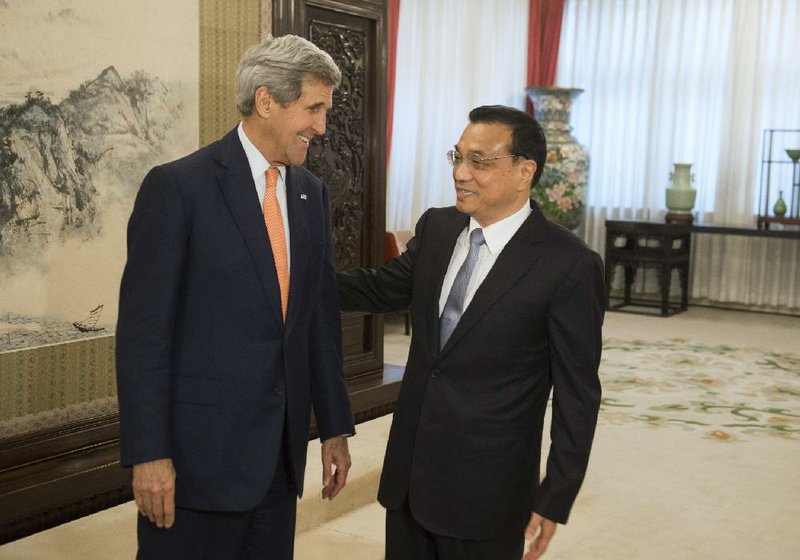BEIJING -- China and the United States budged not a bit Saturday over Beijing's assertive development in disputed parts of the South China Sea, with Foreign Minister Wang Yi politely but pointedly dismissing Washington's push for a diplomatic solution to ease tensions.
Wang and U.S. Secretary of State John Kerry stressed the importance of dialogue to resolve competing claims in the waterway. But neither diplomat showed any sign of giving ground over Chinese land reclamation projects that have alarmed the U.S. and China's smaller neighbors.
The U.S. and most members of the Association of Southeast Asian Nations want a halt to the projects, which they suspect are aimed at building islands and other land features over which China can claim sovereignty.
"We are concerned about the pace and scope of China's land reclamation in the South China Sea," Kerry said. He urged China to speed up talks with the association on guidelines for handling maritime activity in disputed areas.
The goal is to help "reduce tensions and increase the prospect of diplomatic solutions," Kerry said.
"I think we agree that the region needs smart diplomacy in order to conclude the ASEAN-China code of conduct and not outposts and military strips," Kerry told reporters at a news conference with Wang.
Wang indicated that while China was prepared to talk, it would not back down on the construction that, he said, "is something that falls fully within the scope of China's sovereignty."
"The determination of the Chinese side to safeguard our own sovereignty and territorial integrity is as firm as a rock, and it is unshakable," he said.
"It has always been our view that we need to find appropriate solutions to the issues we have through communications and negotiations that we have among the parties directly concerned with peaceful and diplomatic means on the basis of respecting historical facts and international norms. This position will remain unchanged in the future."
Wang added that the differences between China and the U.S. could be managed "as long as we can avoid misunderstanding and, even more importantly, avoid miscalculation."
The Chinese claims and land reclamation projects have rattled the region where South China Sea islands and reefs are contested by China and five other Asian governments. Activities have led to clashes, accompanied by nationalistic protests and occasional serious diplomatic implications.
The U.S. says it takes no position on the sovereignty claims but insists they must be negotiated. Washington also says ensuring maritime safety and access to some of the world's busiest commercial shipping routes is a U.S. national security priority.
China has bristled at what it sees as U.S. interference in the region and wants to negotiate with the ASEAN countries individually, something those much smaller nations fear will not be fair.
In one disputed area, the Spratly Islands, U.S. officials say China has reclaimed about 2,000 acres of dry land since 2014 that could be used as airstrips or for military purposes. The U.S. argues that man-made constructions cannot be used to claim sovereignty.
Obama administration officials have declined to comment on reports that it may deploy military assets, or that it is considering a demonstration of freedom of navigation within 12 nautical miles of the islands' notional territorial zone. But they have said many of the features claimed by China in the disputed Spratlys are submerged and do not carry territorial rights, and said that China cannot "manufacture sovereignty."
Despite the clear disagreements over the South China Sea, Kerry and Wang said they were on track to make progress in other areas, notably on climate change, the fight against violent extremism, preparations for the next round of the U.S.-China Strategic and Economic Dialogue in June, and Chinese President Xi Jinping's visit to Washington in September.
They also expressed pleasure with their cooperation in the Iran nuclear talks and their solidarity in trying to denuclearize North Korea.
Kerry said he believed an Iran agreement could have "a positive influence" on North Korea, because it would show that giving up nuclear weapons improves domestic economies and ends isolation. He stressed, though, that there was no way to tell if North Korea's reclusive leadership would be able to "internalize" such a message.
"I am sure Foreign Minister Wang would join me in expressing the hope that if we can get an agreement with Iran ... that agreement would indeed have some impact or have a positive influence" on North Korea, Kerry said.
Kerry said an Iran deal could help in showing North Korea how "your economy can do better, your country can do better, and you can enter into good standing with the rest of the global community by recognizing that there is a verifiable, irreversible, denuclearization for weaponization, even as you can have a peaceful nuclear power program."
"Hopefully that can be a message, but whether or not DPRK is capable of internalizing that kind of message or not, that's still to be proved," he said, referring to North Korea by the acronym of its official name, the Democratic People's Republic of Korea.
International negotiators are rushing to finalize a nuclear deal with Iran by the end of June under which Iran's program would be curbed to prevent it from developing atomic weapons in exchange for the lifting of international sanctions that have crippled its economy.
Nuclear talks with North Korea broke down three years ago as it has continued atomic tests and ballistic missile launches. North Korea conducted its first nuclear test in 2006.
Closing out his short tour in Asia, Kerry met with Chinese President Xi Jinping this morning and was to travel to South Korea, where North Korea was expected to be a major topic of discussion.
He said the United States will continue to work with its partners "to make it absolutely clear to the DPRK that their actions, their destabilizing behavior is unacceptable against any international standard."
A Section on 05/17/2015
